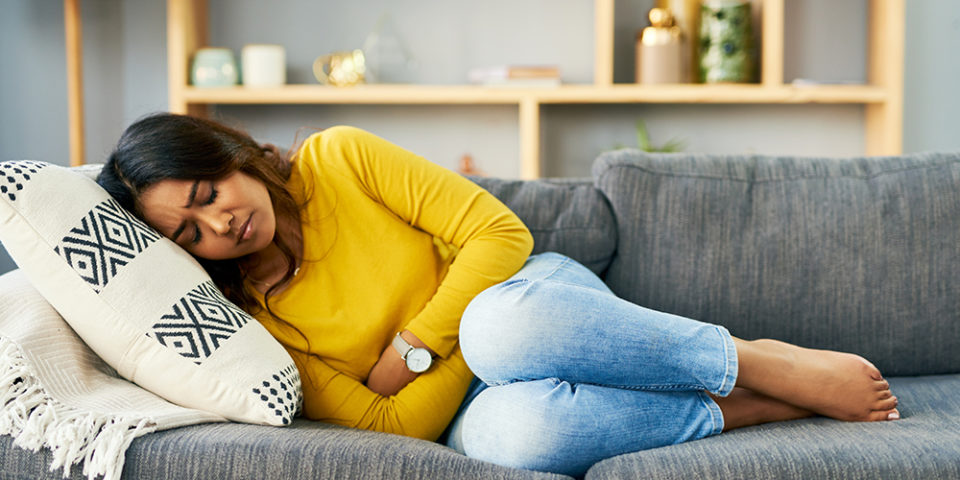What does a healthy period feel like?
While most of those who menstruate will get their first period around the age of 12, it can occur as early as 8 or even much later into the teen years. In a world where period cramps, nausea and other uncomfortable period symptoms are taken for granted, it can be hard to know what a healthy period looks and feels like.
OB/GYN Kelly Brier San Miguel, MD, offered advice for all ages on what a healthy period feels like and how to know if you should speak to a doctor to help lessen your own discomfort each month.
What does a healthy period feel like?
“So, your period happens as a result of your body entering puberty and beginning to prepare each month for the possibility of a pregnancy,” said Dr. San Miguel. “The lining of the uterus thickens, one of the ovaries releases an egg during ovulation, and the egg moves down one of the fallopian tubes toward the uterus. If fertilization with sperm doesn’t happen, there’s no pregnancy, and the thickened lining of the uterus breaks down. It then flows out of the body over the course of multiple days.”
No two menstrual cycles are entirely alike, and there’s a range of timelines that can be perfectly normal and healthy for your body. A normal menstrual cycle occurs from about every 21 days up to potentially every 45 days, and a typical period lasts between two to seven days, with the heaviest bleeding during the initial 72 hours.
Are menstrual cramps a normal part of having a period?
“Some pain and discomfort before or during your menstrual period is very, very common,” said Dr. San Miguel. “More than half of those with periods have at least some pain for one to two days per month in the lower abdomen or back.”
Over-the-counter medications like ibuprofen, acetaminophen, or naproxen can be taken to help ease menstrual cramps. Physical activity and exercise can also help relieve that discomfort, as can a heating pad, wrap, a bath or other source of heat on your lower abdomen or back.
Pain and discomfort being common, however, doesn’t always mean they are normal. Whether you face mild or severe pain, you can always ask your gynecologist or another healthcare professional for help. Menstruation shouldn’t mean suffering. Speak to your doctor to help you learn more about conditions like PMS or PMDD.
Are mood swings normal during your period? What about stomach problems?
“Some level of mood swings or stomach problems during the time just prior to your period or during the first day or so are common,” said Dr. San Miguel. “It’s when those symptoms are severe or cause difficulty to your life that you may want to consider your symptoms could be due to PMS or PMDD.”
What is PMS? How is PMDD different from PMS?
“The term PMS stands for premenstrual syndrome, and it refers to a whole collection of symptoms that someone might experience up to two weeks prior to their period through the first couple of days of menstruation,” said Dr. San Miguel. “For some women, these symptoms don’t disrupt their daily lives, but for others they can be very severe.”
PMS symptoms include:
- Swollen or tender breasts
- Bloating
- Cramps in the abdomen and lower back
- Headache
- Lower tolerance for noise or light
- Irritability, fatigue or anxiety
- Clumsiness
- Depression or feelings of sadness
- Lowered libido
- Changes in bowel movements
When symptoms are severe enough to interfere with daily life and cause problems with work or personal relationships, your physician may want to evaluate you for premenstrual dysphoric disorder, or PMDD.
Is PMS the same as the ‘period flu’?
While there is no actual virus present, some of the menstrual symptoms like bloating, fatigue, nausea, feeling overheated or having headaches can all be a common part of a normal menstrual cycle and come from the activation of the immune system.
How are PMS and PMDD treated?
“Mild to moderate symptoms are often relieved by changing your lifestyle or what you’re eating,” said Dr. San Miguel. “We know that physical activity can help lessen cramps. Eating healthy but low-key foods to reduce stomach discomfort is effective, too.”
Some methods of birth control also help to lessen PMS symptoms, and some of those with PMDD have found hormonal birth control an essential part of their treatment plan. Over-the-counter medicines like ibuprofen or acetaminophen help to reduce pain, and antidepressants are sometimes used to alleviate the worst of the mood changes.
Time spent outdoors in the sun, regular exercise and getting plenty of sleep all help to control stress and lower your overall discomfort. For those who struggle with fatigue, allowing yourself that extra rest during the first day or so can help you feel better during the rest of your period.
Is it normal to skip a period, or is it a sign of a more serious problem?
“Having an irregular cycle where the number of days between your period changes from month to month, are what we consider ‘common, but not normal’,” said Dr. San Miguel.
Skipping a period here or there is possible during stressful times of your life, and it can happen for reasons outside of serious medical problems. However, if you have any of the following concerns, you may have a problem that needs medical attention:
- You are 15 or older and have never had a period
- It has been three years since your breasts developed and you have never had a period
- You are 14 or older, have never had a period and you have an eating disorder, exercise a lot or have hirsutism (excessive body hair growth)
- Your periods were regular each month and then they stopped being regular
- Your period comes more often than every 21 days or less often than every 45 days
- Your periods come more than 90 days apart, even for one cycle
- Your period lasts more than seven days
- You must change your tampon or pad more than once every one to two hours
- You (or a family member) have a problem with blood clotting
- You feel dizzy or faint
Regardless of age, you should be evaluated if any of these issues occur. Causes of abnormal periods include polycystic ovary syndrome, or PCOS, bleeding disorders, eating disorders, malnutrition or extreme exercise, sexually transmitted diseases, a growth in the uterus like a polyp or tumor, or hormonal problems involving ovulation or the thyroid gland. All of these conditions do have treatments available.
Does a heavier or lighter period have anything to do with fertility?
Having an unusually heavy or light period could affect your fertility, even if your period is still regular. Many possible underlying causes of these symptoms could lead to an inability to get pregnant or sustain a healthy pregnancy.
Your doctor can take a closer look and work with you on understanding and dealing with any fertility concerns.
Choose a caring, trusted OB/GYN
Find a provider who’s right for you by viewing their online profiles, star ratings and reviews.
Find an OB/GYN

